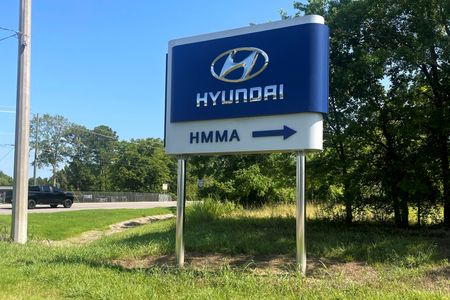By Heekyong Yang and Joyce Lee
SEOUL (Reuters) – Hyundai Motor and affiliate Kia Corp will book a combined 2.9 trillion won ($2 billion) provision in their third-quarter results as they continue to suffer the effects of engine recalls from years ago, they said on Tuesday.
The costs, of which Hyundai accounted for 1.36 trillion won and Kia for 1.54 trillion won, amount to more than half of Hyundai’s estimated third-quarter net profit and 77% of Kia’s profit, Refinitiv data shows.
The provisions are due to an increase in the number of engine replacement claims as more U.S. customers have opted to drive their old cars over buying a new one amid tight vehicle production caused by a global chip shortage, the South Korean group said in a statement.
Hyundai and Kia, among the world’s top 10 automakers by vehicle sales, recalled nearly 1.7 million vehicles in 2015 and 2017 in one of their biggest recalls in the United States, citing a problem with their Theta GDI engine that raised the risk of crashes.
After the recall, the duo offered an unprecedented lifetime engine warranty as part of efforts to improve their tarnished reputations.
Korea Investment & Securities analyst Kim Jin-woo said the provisions – unlike a recall – were unlikely to have a major impact on the firms’ brand value and credibility, and described the cost as “reasonable” given it factored in the post-COVID trading environment.
APOLOGY
“We sincerely apologise for repeated quality issues and additional costs related to the Theta II GDI engine recall,” Cha Seong-ju, head of the quality division at Hyundai Motor Group, told analysts.
“We will put our utmost efforts to secure engine quality… and manage quality related cost in order to prevent a repetition of quality issues.”
Hyundai said it had raised provisions to reflect new engine replacement claims that are running ahead of its previous forecasts due to a rise in the overall lifetime of passenger vehicles.
The lifetime of U.S. cars grew to 13.1 years this year from 12.4 years in 2020, according to S&P Global Mobility.
Graphic: Cars Keep Getting Older – https://graphics.reuters.com/US-AUTOS/lbvgnqkdmpq/chart.png
The auto group has also factored in the recent weakness of the Korean won against the U.S. dollar, leading to additional costs.
In 2020, Hyundai and Kia together made 3.6 trillion won in provisions related to engine issues.
Hyundai Motor is scheduled to report its July-September earnings next Monday, while Kia has not yet announced when it will report its third quarter results.
($1 = 1,422.8200 won)
(This Oct. 18 story has been refiled to change to ‘cars’ in paragraph 10 from ‘passenger vehicles’)
(Reporting by Heekyong Yang and Joyce Lee; Editing by Mark Potter and Miyoung Kim)

